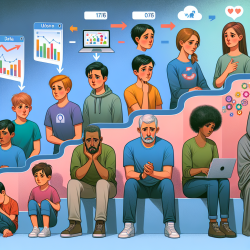Introduction
The COVID-19 pandemic has left a profound impact on children, adolescents, and their families, a fact that is increasingly recognized by policymakers and mental health professionals alike. The research article, Next Generation Europe: A Recovery Plan for Children, Adolescents and Their Families, underscores the urgent need for a strategic recovery plan that addresses the psychological and emotional toll of the pandemic. This blog aims to translate the research findings into actionable insights for practitioners, encouraging them to refine their skills and advocate for better outcomes for the younger generation.
Understanding the Impact
The pandemic has exacerbated existing mental health issues among children and adolescents. The restrictions imposed to control the virus have disrupted their social and educational environments, leading to increased psychological stress. The research highlights two potential post-pandemic scenarios: one where children and families adapt and recover, and another where they are left behind, suffering prolonged consequences.
As practitioners, it is crucial to understand these dynamics and prepare to address the varied needs of both groups. Data from the research indicates a significant rise in anxiety, depression, and other mental health issues among children, necessitating a proactive and informed approach to therapy and support.
Implementing Data-Driven Strategies
To effectively support children and adolescents, practitioners should consider the following data-driven strategies:
- Whole Family Strategies: Encourage family-based interventions that foster resilience and coping mechanisms. Families that engage in collective activities such as cooking, learning, and playing together tend to navigate crises more effectively.
- Policy Advocacy: Work alongside policymakers to ensure that children's needs are prioritized in recovery plans. This includes advocating for increased funding and resources for mental health services.
- Enhanced Support Systems: Recruit and train additional personnel in schools and mental health services to provide targeted support to children and families in need.
- Digital Solutions: Leverage technology to maintain therapeutic relationships and provide remote support. The research highlights the successful adoption of telemedicine during the pandemic, which can be further developed to include youth-appropriate digital participation.
- Monitoring and Surveillance: Establish systems to track the long-term mental health impacts of COVID-19 on children, particularly those related to infection-related issues.
Encouraging Further Research
While the research provides a comprehensive overview of the challenges faced by children and adolescents, it also opens avenues for further investigation. Practitioners are encouraged to delve deeper into specific areas such as the impact of digital learning on mental health, the effectiveness of family-based interventions, and the long-term consequences of pandemic-related disruptions.
By engaging in continuous research and data analysis, practitioners can refine their approaches and contribute to a more robust understanding of child and adolescent mental health in the post-pandemic era.
Conclusion
The findings from the Next Generation Europe research underscore the critical need for a coordinated and data-driven response to the mental health challenges faced by children and adolescents. By implementing the strategies outlined above, practitioners can play a pivotal role in shaping a brighter future for the next generation.
To read the original research paper, please follow this link: Next generation Europe: a recovery plan for children, adolescents and their families.










